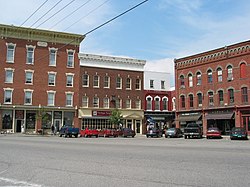Fair Haven, Vermont
| Fair Haven, Vermont | |
|---|---|
| Town | |

Main Street
|
|
 Located in Rutland County, Vermont |
|
 Location of Vermont with the U.S.A. |
|
| Coordinates: 43°37′08″N 73°16′06″W / 43.61889°N 73.26833°WCoordinates: 43°37′08″N 73°16′06″W / 43.61889°N 73.26833°W | |
| Country | United States |
| State | Vermont |
| County | Rutland |
| Chartered | 1779 |
| Area | |
| • Total | 18.1 sq mi (47.0 km2) |
| • Land | 17.6 sq mi (45.7 km2) |
| • Water | 0.5 sq mi (1.3 km2) |
| Population (2010) | |
| • Total | 2,734 |
| • Density | 150/sq mi (58/km2) |
| • Households | 1,135 |
| • Families | 738 |
| ZIP code | 05743 |
| Website | www.fairhavenvt.org |
Fair Haven is a town in Rutland County, Vermont, United States. The population was 2,734 at the 2010 census. Within the town is located the census-designated place of Fair Haven. The town is noted for its late 19th century residential and commercial architecture.
It was chartered on October 27, 1779, to Ebenezer Allen and 76 associates, and first settled the same year. The township originally included West Haven, which was set off on October 20, 1792. The post office at Fair Haven was established in 1797. In 1783, Colonel Matthew Lyon moved to Fair Haven and began building mills at the falls on the Castleton River. His enterprises included a gristmill, sawmill and papermill, in addition to a forge, as well as a newspaper, the Fair Haven Gazette. This began Fair Haven's legacy as a small, prosperous mill town, which by 1859 included a marble mill, rolling mill, nail factory, papermill producing wall paper, three sawmills, a wagon shop, a machine shop, two blacksmith shops, and two shoe shops.
The quarrying and manufacture of slate began in 1846. Fair Haven would develop extensive quarries for the stone, believed at the time to be inexhaustible, which was supplied to cities along the Atlantic coast and in the West. Some of it was made into the framed, book-sized writing slates that students of the time used. On April 7, 1880, a very small area of Fair Haven was transferred to New York due to a change in the course in the Poultney River. The area transferred was west of the "middle of the deepest channel" of the river.
...
Wikipedia
